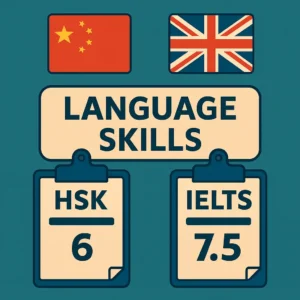Resume for China is not the same as the one you’d use in the U.S. or Europe. Applying for jobs in China means you need a document tailored to local expectations. If you submit the wrong style, recruiters may skip your application before they even read your skills. Crafting a Resume for China requires adapting to cultural, linguistic, and professional norms that are unique to this market.
5 Challenges of Chinese Translators When Working on Projects
How Does O2O (Online-to-Offline) Work in China?
Why Chinese Resumes Are Different
Language proficiency is one of the most valuable assets for global job seekers in China. A strong Resume for China should highlight both Mandarin and English abilities.
Mention your Mandarin level (e.g., HSK 5) and, if possible, link to the HSK Official Test Center to verify and showcase your Mandarin proficiency. Similarly, if you’re emphasizing English ability, referencing the IELTS Official Website can strengthen your profile and provide credibility.
📌 Example: HSK 5 (Advanced), TOEFL 105, six-month exchange at Fudan University.
1. Pick the Right Format
In China, the chronological format (listing education and work history in reverse order) is the safest choice.
- Chronological resume (时间顺序简历): Best if you have a steady career progression.
- Functional resume (功能简历): Focuses on skills, useful if you’re changing careers.
💡 Tip: Multinationals in China may also want an English version, but you should always prepare a Chinese resume first.
2. Start with Personal Information
Chinese resumes usually begin with personal details. This may feel unusual if you’re used to Western standards, but it’s expected locally.
Include:
- Full name (in both English and Chinese, if available).
- Date of birth or age.
- Gender.
- Contact information (phone, email, WeChat ID).
Optional but sometimes requested:
- Marital status.
- A professional headshot.
3. Emphasize Education

Chinese employers often place a strong emphasis on education, especially if you’re applying for your first role in the country.
- List degrees in reverse chronological order.
- Use Chinese names for universities (e.g., 北京大学 instead of “Peking University”).
- Highlight honors, scholarships, or study abroad programs.
This section often appears before work experience, particularly for younger candidates.
4. Showcase Language and Cross-Cultural Skills

Language proficiency is one of the most valuable assets for global job seekers in China.
- Mention your Mandarin level (e.g., HSK 5).
- Include English or other languages with test scores if available.
- Add international experience, such as study abroad or internships.
📌 Example: HSK 5 (Advanced), TOEFL 105, six-month exchange at Fudan University.
Real-Life Advice from Successful Applicants
Many job seekers who successfully adapted their Resume for China and secured roles in Chinese companies highlight a few proven strategies:
- Keep it culturally aligned – Maria, a Spanish engineer hired by a Shanghai automotive firm, shared: “I listed my university name in Chinese and highlighted my HSK 5 certificate. Recruiters immediately told me it made my profile more trustworthy.”
- Show measurable results – David, an American marketing manager now working in Beijing, explained: “Instead of vague job descriptions, I quantified my achievements. Writing ‘boosted WeChat engagement by 30%’ caught their attention right away.”
- Include a polished photo – A German graduate who landed her first role in Shenzhen said: “I wasn’t used to adding photos to resumes, but in China it’s expected. A simple professional headshot made my application look complete.”
- Prepare bilingual versions – Several candidates stressed the value of submitting both English and Chinese resumes. This reassured recruiters that they could communicate across cultures while respecting local norms.
5. Tailor Work Experience
Recruiters in China want clear job titles and measurable results.
- Keep descriptions concise: 3–4 bullet points per role.
- Translate company names into Chinese if possible.
- Focus on outcomes, not just responsibilities.
Example:
Marketing Specialist, XYZ Tech (科技公司)
- Ran bilingual WeChat campaigns that boosted engagement by 28%.
- Coordinated with Shanghai design teams for product launches.
6. Keep Resume Length Reasonable
While a one-page CV is standard in the U.S., in China it’s normal for resumes to be 1–2 pages, especially if you have several years of work history.
Avoid fancy graphics and colors. A simple, professional layout works best.
7. Add Extra Sections
Chinese employers often value additional details:
- Certifications (PMP, CFA, HSK).
- Skills (software, technical tools, industry-specific abilities).
- Hobbies (optional, but can humanize your profile).
If your hobbies highlight teamwork or discipline (e.g., martial arts, music, volunteering), they may add a positive touch.
8. Use the Right Language and Tone
- For Chinese companies: prepare your resume in Simplified Chinese.
- For multinationals: submit both Chinese and English versions.
- Keep your tone formal and respectful; avoid slang or humor.
Resume Structure for China (Template)
Here’s a simple structure you can follow:
- Personal Information – Name, age, gender, contact info, photo (optional).
- Education – Degree, university (with Chinese name), dates.
- Work Experience – Job titles, companies, dates, 2–3 bullet points per role.
- Skills – Languages, IT tools, professional strengths.
- Certifications & Training – HSK, PMP, CFA, etc.
- Hobbies & Interests (optional).
Key Takeaways
- Adapt to Chinese resume standards to avoid being filtered out.
- Emphasize education, certifications, and languages.
- Keep it professional, clean, and 1–2 pages max.
- Prepare both Chinese and English versions if applying to multinationals.
We provide professional Resume for China translation and localization services that ensure your CV meets local standards and appeals to Chinese recruiters. Contact us today to get started and take the next step toward your career in China!
We provide professional Resume for China translation and localization services that ensure your CV meets local standards and appeals to Chinese recruiters. Contact us today to get started and take the next step toward your career in China!
